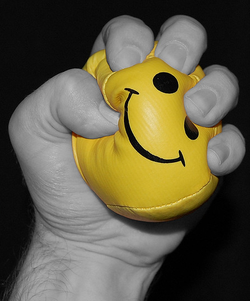
Between 2008 and 2010 the report found 846 more suicides among men than historical trends would have led them to expect. There were 155 more suicides among women. This is the first time fluctuations in unemployment have been associated with suicide rates among women. This increase in suicide rates follows 20 years of rates being down in England.
Due to the economic crisis taking affect unequally across England's regions the BMJ report has taken the opportunity to measure whether recession and unemployment are “significant determinants of rising suicides in England.”
You don't have to know much about the economy (stupid) to know the recession has many of us self medicating with alcohol, food and 50 Shades of Grey. You also don't have to scroll down the Daily Mail sidebar of shame to see how this is physically and mentally costing us.
An Insight Research Group survey found that 8 out of 10 GPs reported an increase in patients suffering from mental health disorders, which they linked to stress concerning the recession. An increase in alcohol abuse, reduction in exercise and OCD.
In January this year the National Office of Statistics published showed a rise in older men committing suicide. From 2007 onwards suicide rates have increased among men between the ages of 45 and 74. Men's Health Forum's external affairs officer Colin Penning commented: “We have been highlighting the high rate of suicide in men for some years...Our 2009 conference on men's health and heard that how uncertainty about jobs could hit men's mental health. The increase in suicides among older men might be a symptom of this.”
The higher suicide rates in males is often cited my Male Rights Activists as the reason for their presence (not that they drive men to suicide, that these vulnerable men need MRAs to defend them). The increase in male suicide is most definitely an issue that needs addressing. Studies such as the one published in the BMJ is part of this required process. However it is arguable that instead of claiming feminists hatred of men is having a fatal impact on men, providing men with better coping methods often employed by women (who, incidentally, don't hate men) might create a healthier attitude.
The charity CALM or Campaign Against Living Miserably provides support for men under the age of 35 who feel depressed or suicidal. CALM will provide help for anyone who requests it but the focus is on young men, CALM magazines are distributed in Topman and there are CALM zones.
It is curious that in a country where the House of Lords is 4/5ths male, women make up 25% of the Houses of Parliament and the pay gap remains at 15% that CALM claims in their manifesto that “Men are often ignored.”
I have to assume they mean men's cry for help is often ignored. CALM go on to describe a generation of disenfranchised men who don't know where they fit in: “What is the modern man meant to look like? We’re not talking about using moisturiser, this isn’t the 1990s. Billboard hunks ignore reality, 'lads mags' ignore diversity (no, not that Diversity). All that men are and can be in the 21st century is lost in marketing crap.”
If that paragraph looks rather familiar it is because it smacks of disenfranchised feminist frustrations at overly superficial modern expectations. Because the frustrating thing is it turns out we aren't so different.
The extremely serious findings in the BMJ report suggests that now as both sexes find it harder to find security in the workplace we need not only to find solace in each other but create an environment where mental health is an approachable subject. Together we are stronger.
Let's talk over a glass of white wine and box of tissues.
Squeamish Kate


 RSS Feed
RSS Feed
